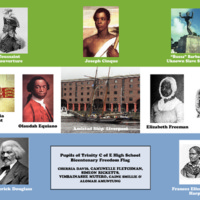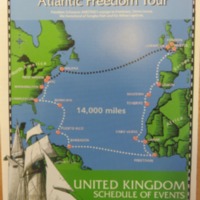
Bicentenary Freedom Flag
The Bicentenary Freedom Flag was displayed alongside an exhibition about Wartime Black History at Manchester Town Hall. The project was a collaboration between staff from Manchester City Council Corporate Services Black Staff Group and pupils of Trinity Church of England School in Manchester. The flag recognised the work, struggles and sacrifices of those who brought the slave trade to an end, and featured images of prominent individuals on the background of the Sierra Leone flag. Those featured on the flag included Toussaint L'Ouverture (General of the Haitian Uprising), the abolitionist Olaudah Equiano, the anti-slavery orator Frederick Douglass, the statue in Barbados of 'Bussa', the unknown slave, guide of the Underground Railroad Harriet Tubman, and Joseph Cinque, leader of the Amistad slave ship revolt. The accompanying exhibition included pupils' articles and creative writing. It also examined the history and role of the West India Regiments, British colonial infantry regiments largely recruited amongst freed slaves from North America and slaves purchased in the West Indies.

Amistad America's Atlantic Freedom Tour
A replica of the nineteenth-century slave ship Amistad visited Liverpool, Bristol and London as part of the Atlantic Freedom Tour in 2007-2008. The ship set sail from its home port of New Haven, Connecticut, on a 16-month 14,000 mile transatlantic voyage to retrace the slave industry triangle. The ship stopped at more than a dozen Atlantic ports, including Freetown in Sierra Leone. Students from the UK had the opportunity to join the crew of the schooner – a replica of the original ship commandeered by 53 of its African captives in 1839 – on one of its legs, and transmitted text, images and videos back to the classroom. At each UK port, the ship was open for guided tours. There were also accompanying lectures.